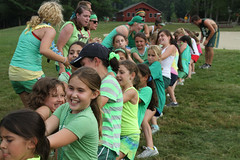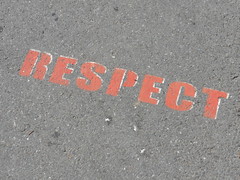 Our society has long promoted the idea that intelligent people do well on tests and earn good grades. But Howard Gardner, a Professor of Education at Harvard University argues that there are multiple intelligences or ways of processing and using information that are necessary. In his recent research, Five Minds for the Future, Gardner describes “five minds” or ways of thinking and acting that will determine success in the future. Gardner’s research shows that children need to cultivate both academic skills and character — that developing “the respectful” and “the ethical” minds is essential–this is where summer camp comes into play.
Our society has long promoted the idea that intelligent people do well on tests and earn good grades. But Howard Gardner, a Professor of Education at Harvard University argues that there are multiple intelligences or ways of processing and using information that are necessary. In his recent research, Five Minds for the Future, Gardner describes “five minds” or ways of thinking and acting that will determine success in the future. Gardner’s research shows that children need to cultivate both academic skills and character — that developing “the respectful” and “the ethical” minds is essential–this is where summer camp comes into play.
 Camp experiences are designed with the whole child in mind and to take things further. Camp helps children develop respect for others, hone personal character, and learn to negotiate and appreciate diverse people. Although this learning should take place all year long, most education systems operate on old models, so summer camp provides opportunities that are often difficult to find at school.
Camp experiences are designed with the whole child in mind and to take things further. Camp helps children develop respect for others, hone personal character, and learn to negotiate and appreciate diverse people. Although this learning should take place all year long, most education systems operate on old models, so summer camp provides opportunities that are often difficult to find at school.
Gardner believes that to be successful, each person must figure out a unique personal combination of intelligences from his list—disciplined, synthesizing, creating, respectful and ethical minds–since there are multiple ways to approach life and work. Here’s a brief introduction to his categories and why children need to develop these « minds »:
1. A disciplined mind knows a lot about something like History or Math and works to learn more. These ways of thinking are challenging to learn and require practice since they are in areas that the human brain is not prewired to understand.
2. The synthesizing mind has the ability to deal with information overload by understanding what to pay attention to, what to ignore, and how to put this information together in useful ways to share with others.
3. The creating mind works to generate new ideas using comprehensive knowledge and synthesizing what has been learned. A creative mind takes chances and uses even negative feedback to be innovative.
4. The respectful mind does more than tolerate differences but goes further to cultivate respect, along with emotional and interpersonal intelligence. This requires embracing and celebrating diversity on multiple levels—and welcoming difference as a fact of living in our amazing world.
5. The ethical mind thinks about how individual work and needs are connected to society. This mind conceptualizes how workers can serve purposes beyond their own self-interest and become citizens who work unselfishly to improve things for other people.
 Gardner explains that our changing world especially needs new “respectful” and “ethical “minds. In the future, citizens and workers will rely on « out-of-the-box » and non-linear thinking skills to solve changing and complex challenges. For example, solving real world problems like the complex syndrome of autism, involves understanding medicine and education so interdisciplinary expertise and a team approach is the best way to find solutions. Students need to not only master “the box” but also need other skills to “think outside” of it!
Gardner explains that our changing world especially needs new “respectful” and “ethical “minds. In the future, citizens and workers will rely on « out-of-the-box » and non-linear thinking skills to solve changing and complex challenges. For example, solving real world problems like the complex syndrome of autism, involves understanding medicine and education so interdisciplinary expertise and a team approach is the best way to find solutions. Students need to not only master “the box” but also need other skills to “think outside” of it!
We know that summer camp gives children the time and space to learn how to contribute as individuals within the group. Throughout the summer weeks, each unique camper tries out activities and comes to understand their personal strengths. With the help of staff they learn to negotiate differences and truly learn how to support each other. While an unaware observer might just see children having fun, camp is actually full of opportunities for showing care, practicing teamwork and developing multiple minds! It’s a great place for personal growth, acquiring life skills, having fun and making memories all at the same time.
What do you think about Gardner’s theories? Do you think that interpersonal respect and teamwork are as equally important as academics?
Deborah-Eve

Thank you for the images harpreet thinking and twicepix.

 570-798-9831
570-798-9831